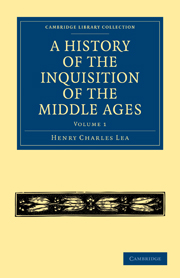Book contents
- Frontmatter
- PREFACE
- Contents
- BOOK I—ORIGIN AND ORGANIZATION OF THE INQUISITION
- CHAPTER I THE CHURCH
- CHAPTER II HERESY
- CHAPTER III THE CATHARI
- CHAPTER IV THE ALBIGENSIAN CRUSADES
- CHAPTER V PERSECUTION
- CHAPTER VI THE MENDICANT ORDERS
- CHAPTER VII THE INQUISITION FOUNDED
- CHAPTER VIII ORGANIZATION
- CHAPTER IX THE INQUISITORIAL PROCESS
- CHAPTER X EVIDENCE
- CHAPTER XI THE DEFENCE
- CHAPTER XII THE SENTENCE
- CHAPTER XIII CONFISCATION
- CHAPTER XIV THE STAKE
- APPENDIX
CHAPTER X - EVIDENCE
Published online by Cambridge University Press: 29 August 2010
- Frontmatter
- PREFACE
- Contents
- BOOK I—ORIGIN AND ORGANIZATION OF THE INQUISITION
- CHAPTER I THE CHURCH
- CHAPTER II HERESY
- CHAPTER III THE CATHARI
- CHAPTER IV THE ALBIGENSIAN CRUSADES
- CHAPTER V PERSECUTION
- CHAPTER VI THE MENDICANT ORDERS
- CHAPTER VII THE INQUISITION FOUNDED
- CHAPTER VIII ORGANIZATION
- CHAPTER IX THE INQUISITORIAL PROCESS
- CHAPTER X EVIDENCE
- CHAPTER XI THE DEFENCE
- CHAPTER XII THE SENTENCE
- CHAPTER XIII CONFISCATION
- CHAPTER XIV THE STAKE
- APPENDIX
Summary
We have seen in the foregoing chapter the inevitable tendency of the inquisitorial process to assume the character of a duel between the judge and the accused with the former as the assailant. This deplorable result was the necessary outcome of the system and of the task imposed upon the inquisitor. He was required to penetrate the inscrutable heart of man, and professional pride perhaps contributed as much as zeal for the faith in stimulating him to prove that he was not to be baffled by the unfortunates brought before him in judgment.
In such a struggle as this the testimony of witnesses, for the most part, counted for little except as a basis for arrest and prosecution, and for threatening the accused with the unknown mass of evidence against him, and for this the slightest breath of scandal, even from a single person notoriously foul-mouthed, sufficed, without calling witnesses. The real battlefield was the prisoner's conscience, and his confession the prize of victory. Yet the subject of evidence as treated by the Inquisition is not wholly to be passed over, for it affords fresh illustration of the manner in which the practice of construing everything “in favor of the faith” led to the development of the worst body of jurisprudence invented by man, and to the habitual perpetration of the foulest injustice. The matter-of-course way in which rules destructive of every principle of fairness are laid down by men presumably correct in the ordinary affairs of life affords a wholesome lesson as to the power of fanaticism to warp the intellect of the most acute.
- Type
- Chapter
- Information
- A History of the Inquisition of the Middle Ages , pp. 430 - 442Publisher: Cambridge University PressPrint publication year: 2010First published in: 1888

